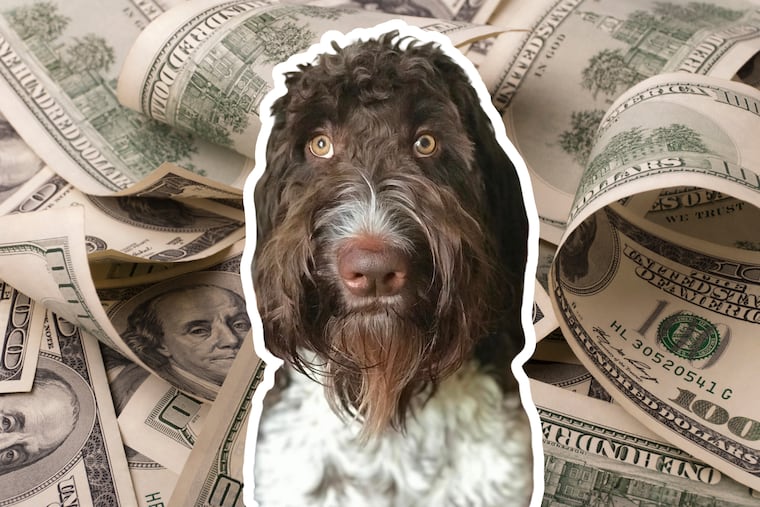
A Pittsburgh couple is going viral after their dog had a very expensive snack.
Clayton Law had just pulled $4,000 in cash out of his and his wife Carrie’s joint savings account, which was going toward a new fence.
Clayton, 34, placed the money on the kitchen counter. But before he could put it somewhere safe, the couple’s 7-year-old Goldendoodle, Cecil, had other plans for the cash.
The damage was done — an uncharacteristic naughty-dog incident for Cecil.
“We were in shock. We couldn’t believe he had eaten the cash,” Carrie said about December incident. “He never does anything like this.”
The Laws reached out to their vet, who said not to worry so long as Cecil was acting normally.
“I then started Googling ‘dog ate money’ to figure out what to do,” Carrie said. “Next, I called our bank and explained the situation. They were so nice.”
All that was left to be done was for the couple to monitor for... movement.
‘It smelled so bad’
The Laws spent the rest of their day trying to piece together the bills — Cecil had thrown up a few. Others were recovered from the other end.
Together, they stood at their utility sink, sorting through the aftermath and celebrating as they found new wads of cash.
”It smelled so bad,” Carrie recalled.
On her Instagram, Carrie documented the debacle. She showed photos of Clayton, wearing gloves, parsing through poo for crumpled bills, and washing them. She cheekily paired her Instagram video to Enya’s “Only Time.”
The incident took place in early December, with Carrie’s video going up on Dec. 14. It’s since been liked nearly 200,000 times and has sparked coverage from outlets including the New York Post and the Washington Post.
“I never expected this post to go viral,” she said. “I made it so our friends could laugh at the absurdity of the situation with us. We are happy that this story is making people smile. He is truly a special dog and it has been fun to share a little bit of his goofy personality with the world.”
She added that there have been a lot of money-laundering jokes.
Only $450 was unrecovered
All in all, the couple was able to recover most of the $4,000 — $3,550 to be exact.
“That last $450 is very damaged,” she said. “We would have to mail it to a government agency. We haven’t looked into the process yet, but it sounds like it can be replaced.”
As for Cecil, he hasn’t had to lawyer up just yet.
“Cecil is such a good boy!” Carrie said. “We were never mad at him. You can’t blame a dog for being a dog. He’s stayed out of trouble and seems to have forgotten his expensive taste.”
What to do if a dog eats your cash
“The bank assured us that this happens all the time,” Carrie said.
In their case, the Laws’ bank replaced the salvaged bills that had the serial numbers intact.
Some banks accept damaged currency as long as more than half of the bill remains. When that happens, the banks send the damaged bills to the Federal Reserve for exchange at face value.
For bills that are severely damaged or missing — like the Laws’ remaining $450, for instance — that’s a job for the Bureau of Engraving and Printing.
The bureau said mutilated currency can be mailed or dropped off to its Washington, D.C., office along with a letter stating the estimated value and what happened to the money. How long a replacement can take varies. Standard claims can take anywhere from six months to three years to process.
Still, Cecil isn’t the only dog to chew up a bunch of cash. Last year, Zoey, a Florida-based Labrador, chewed up nearly $2,000. Before that, Champ the Beagle chowed down $250. A cursory Reddit search revealed dozens of similar incidents (and panicked dog owners).
The U.S. Treasury says it handles, on average, about 24,000 claims and redeems an average of $30 million worth of damaged and mutilated currency annually — including doggy victims.